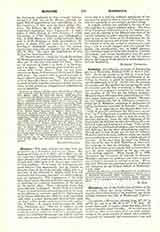

Minister. The term minister has long been appropriated in a distinctive way to the clergy. The language of I Cor., iv, 1-2; Heb., viii, 2; Matt., xx, 26, etc. must have helped to familiarize the thought that those charged with spiritual functions in the Christian Church were called upon to be the servants (ministri) of their brethren. Even before the Reformation the word minister was occasionally used in English to describe those of the clergy actually taking part in a function, or the celebrant as distinguished from the assistants, but it was not then used sine acldito to designate an ecclesiastic. This employment of the term dates from Calvin, who objected to the name priest etc. as involving an erroneous conception of the nature of the sacred office. These Calvinistic views had some influence in England. In the Book of Common Prayer the word minister occurs frequently in the sense of the officiant at a service, and in the thirty-second of the Canons Ecclesiastical (1603) we read “no bishop shall make a person deacon and minister both upon one day”, where clearly minister stands as the equivalent of priest. As regards modem usage the Ilist. Eng. Dictionary says: “The use of minister as the designation of an Anglican clergyman (formerly extensively current, sometimes with more specific application to a beneficed clergyman) has latterly become rare, and is now chiefly associated with Low Church views; but it is still the ordinary appellation of one appointed to spiritual office in any non-Episcopal communion, especially of one having a pastoral charge”.
As regards Catholic use, minister is the title of certain superiors in various religious orders. The head of the Franciscan Order is known as the minister general, and the superior of the different provinces of the various branches is called minister provincial. The same is true of the Order of the Trinitarians for the Redemption of Captives and of some other orders. In the Society of Jesus the second in command in each house, who is usually charged with the internal discipline, the commissariat, etc., is called minister. The statement made in Addis and Arnold‘s “Catholic Dictionary” and thence incorporated into the great Hist. Eng. Dictionary that each of the five assistants of the General of the Jesuits is called minister is without foundation.
HERBERT THURSTON

